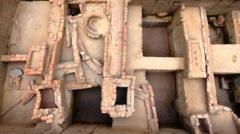The village of Keeladi in Tamil Nadu has emerged as a focal point of political and historical contention following significant archaeological discoveries that suggest a rich, ancient urban settlement. Deep trenches uncovered in this southern locale reveal over 15,000 artifacts, including burial urns, coins, and terracotta structures, indicating that the site may host a civilization dating back 2,500 years.
Experts from the Tamil Nadu State Department of Archaeology propose that these artifacts, many of which date to around 580 BCE, challenge the conventional view that urban civilization in India was predominantly confined to northern regions, particularly during the Indus Valley Civilisation and the Vedic period. The findings at Keeladi, located just 12 kilometers from Madurai, present evidence of an organized, literate society capable of complex undertakings like urban planning and industrial activities.
The excavation efforts, led by Ajay Kumar of the Tamil Nadu State Department, have highlighted the discovery of advanced brick structures and intricate water systems, marking Keeladi as a distinctive urban settlement in southern India. This revelation is newly significant as it places southern India's ancient civilization on par with its northern counterparts, which have traditionally dominated historical narratives.
As discussions unfold, the narrative surrounding the Tamil Brahmi script, which appears to be older than what was previously thought, adds a layer of complexity. Recent graffiti findings suggest independent development from the Ashokan Brahmi script, indicating that the roots of literacy in the region are deeper and more entwined with the Indus Valley than once believed.
However, not all historians are convinced, with some advocating for caution and further evidence regarding these claims. The reaction extends into the political arena as well, where the findings have incited a sense of regional pride while simultaneously raising tensions with the central government. Controversies, such as the transfer of ASI archaeologist Amarnath Ramakrishnan, have been met with accusations from Tamil Nadu officials of attempts to suppress the region's historical legacy.
As Keeladi continues to capture the imagination of historians, politicians, and the public alike, it serves as a mirror reflecting India's ongoing struggle with its rich, yet contentious past. The discoveries here not only deepen the understanding of shared heritage but also highlight the divisions and narratives that shape contemporary Indian society. As archaeologists dig deeper into Keeladi, they unveil a history that connects the present with the past, challenging perceptions and stimulating discussions about identity in modern India.























